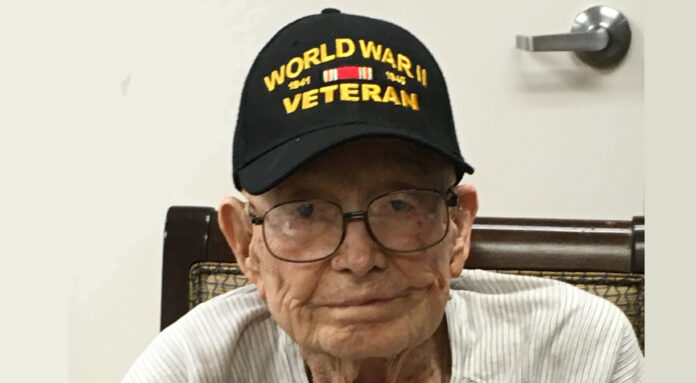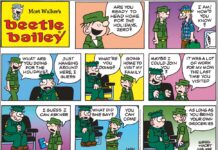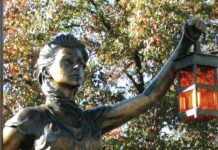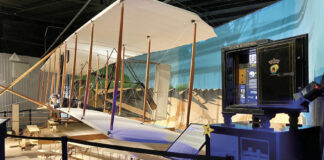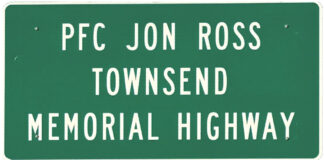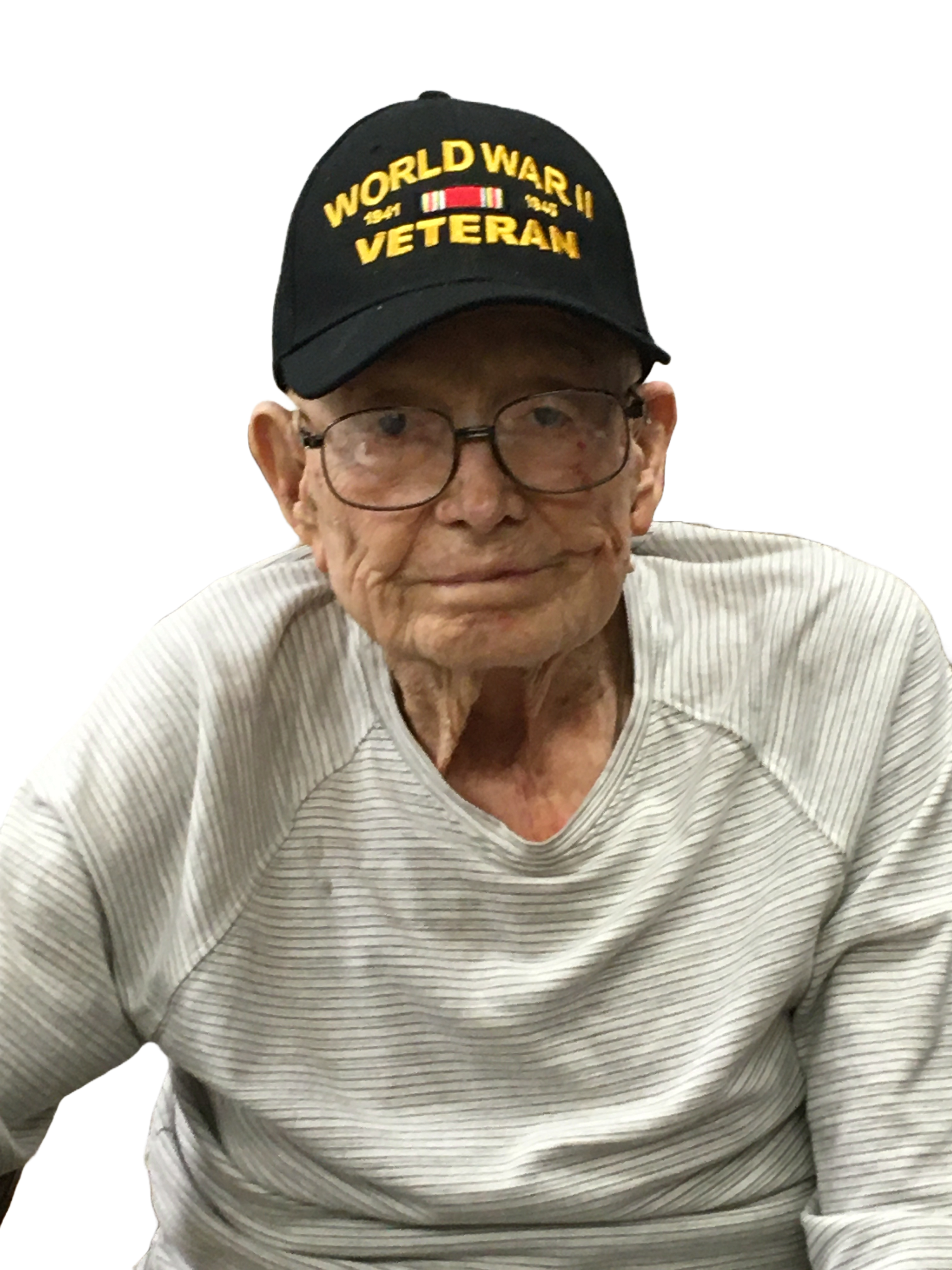
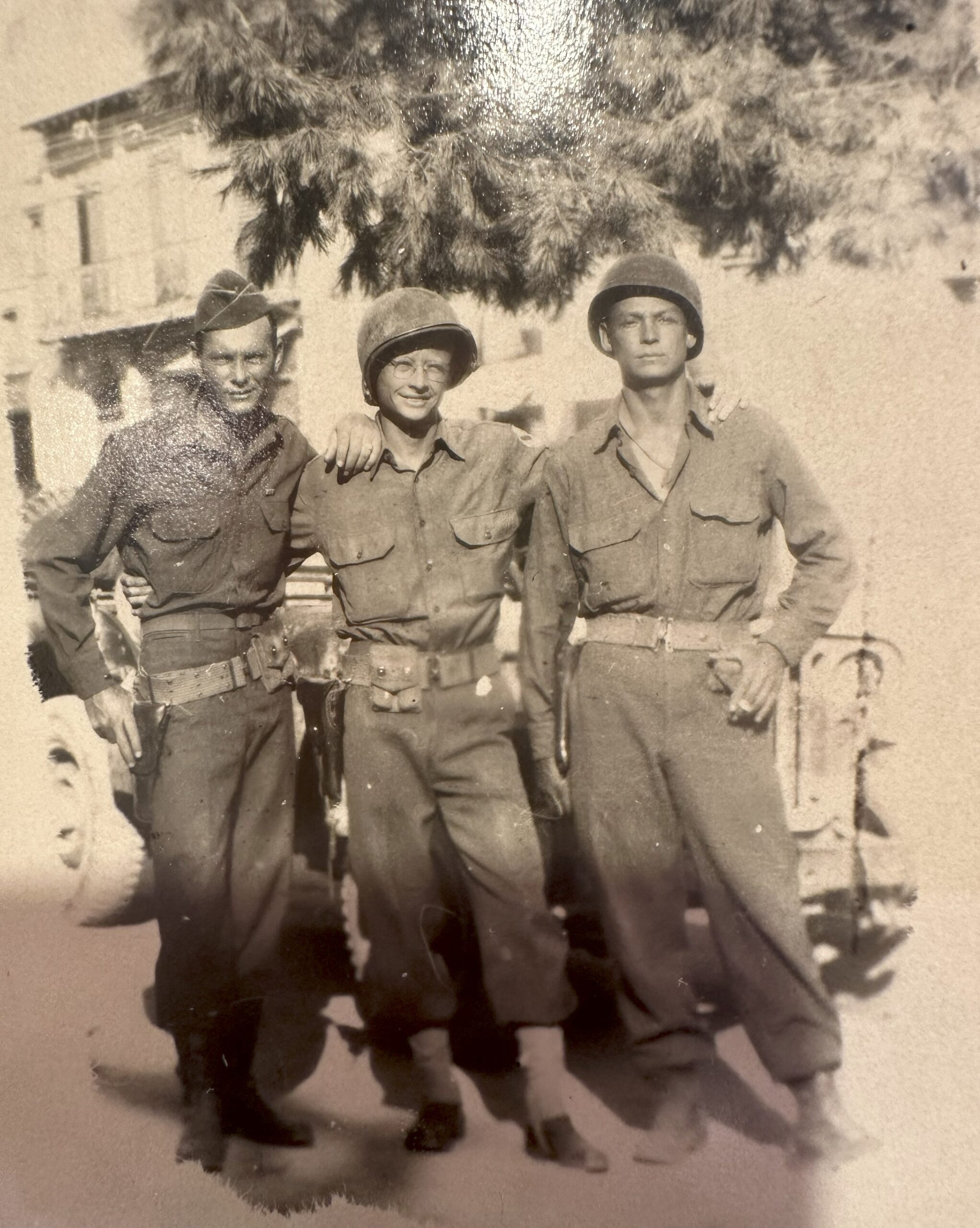
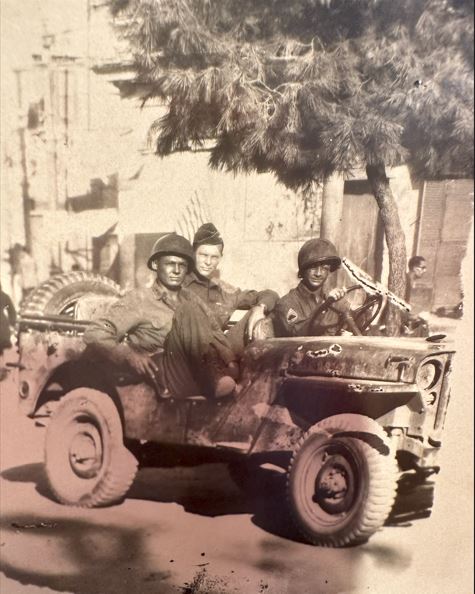
At the age of 89, Woodie Brod Sylvester of Weatherford, Oklahoma, was asked to write about his experiences during WWII. The result was a five-page military autobiography. It’s too long to print verbatim, but a summary of locations and activities are listed with several copied passages. Since the events took place 60 years ago, he didn’t remember all the details.
The big take away is that Woodie served in the US Army Signal Corps starting on April 10, 1942, for over three years – two-and-a-half of them in continuous combat conditions – without leaving the war front. During WWII, soldiers had to serve for the duration plus six months.
Woodie said, “I started out as a buck private (E-1) and I turned out to be the personnel Sergeant Major (E-6) of a battalion with 500 men,” a testament to his ability to increase responsibility and lead men in war. His life story is one of dedication to God, family and nation.
He was born on August 2, 1917, in Chilton, Texas, to Woodie Alvin and Ida Marie (Brod) Sylvester. On August 9, 1938, Woodie and Mattie Elizabeth Adams eloped and married. They birthed three children: son, Sam and two daughters, Jana and Sue after the war.
Below are short descriptions of his amazing duty.
Location Dates and towns identified
North Africa – Landed in Casablanca, Morocco, on Christmas Eve 1942.
On January 10, 1943, headed east towards Tunis, Tunisia. Woodie stated he was close to a soldier who stepped on a land mine and was killed; luckily, he was not hurt. In February 1943, his unit arrived at the Kasserine Mountains, where the Germans defeated the Americans and English in a major battle. Afterwards, General Patton arrived with the 3rd Army and they pushed the Germans out of North Africa.
Sicily – Sailed to Gela, Sicily. GIs gave food to hungry children. Marched to Palermo and made it there in about 31 days.
Italy – Landed on a beach north of Paestum, south of Pompeii, and fought in a battle. Afterwards, soldiers went up to tour volcano Vesuvius and made ash trays out of molten lava. Progressed north to Naples. Spent his second Christmas (1943) in Caserta. Marched to the monastery, Monte Cassino, in February 1944, and saw Allies bomb it. Proceeded north to Rome where Woodie and his company went to the Vatican and were given an audience with the Pope.
Corsica – Sailed to this island, preparing to invade France.
France – Sailed to St. Tropez, French Riviera. His unit joined other invasion forces, such as the 95th Infantry Division. Marched north, following the Rhone River, then moved between Lyon and Dijon. Reached Epinal. In late December 1944, his unit rested in Strasbourg, but retreated back to Epinal because of fears the Germans might win the Battle of the Bulge.
Germany – In 1945, crossed Rhine River and advanced to Heidelberg, then past Camp Dachau, infamous concentration camp. Woodie said they could smell Dachau for miles before they saw the camp but did not have any idea what the smell was. Arrived Darmstadt, and headquartered in the ruins of a university. Rotated back to Lubbock, Texas, in the summer and separated in October 1945.
Several passages of Woodie’s recollections are provided in this story.
North Africa – “The third echelon (of the signal battalion), which I was assigned to, sailed from Boston in early December, landing in Casablanca, Morocco, on Christmas Eve 1942…At Casablanca, we were housed in a warehouse and this would be the last inside housing for many, many months…We left Casablanca around January 10, 1943. Our company, “A,” laid landlines for communications between frontline troops and HQ. It was very cold and we were sleeping in pup tents on sandy grounds. We would sleep at night and in the morning would wash our clothing in gasoline to kill the (sand) fleas. We started to suffer casualties from mines and other actions. Mine fields were everywhere. Many civilian children and adults suffered from these mines as well as our own troops.
We moved daily…toward Tunis, Tunisia, keeping as much pressure on the German army as possible. As we advanced through the desert, we arrived at the Kasserine Mountains. The German army under the direction of German General Rommell was waiting with the powerful Mark 4 tanks. The allies experienced great losses of men and equipment until the American tanks under the direction on General Patton arrived.
At times, the moves were so fast the line crews could not string wire fast enough to keep up with Patton’s tanks. The wire being laid on the ground would break as fast as the line crews could put new wire in place due to tanks and half-tracks.
Italy – We finally entered Rome…So, some of us headed for the Vatican…We entered and were shown through the buildings and then told to be seated in a certain chapel. There were about 100 men in our group…and the Pope appeared and made a short statement. He spoke English quite well and also gave each man a cross to carry. This was a great honor…
France – The battalion…went into Strasbourg, France…We made our headquarters this time in a small hotel. Christmas of 1944 was only a few days away. We were supplied with all kinds of Christmas food, including fresh turkeys. About this time the Battle of the Bulge started and we were ordered to vacate and retreat at once back to Epinal. We destroyed all of our food supplies that we had received for Christmas.
Germany – On our way to Darmstadt, we passed the Camp Dachau where the Jewish people were confined…we could smell this camp but didn’t know about what was happening on the inside. Other troops came in and liberated these people that were nothing but walking skeletons.
I must comment that the men I served with were the “best”. Nothing could be said about them except “great-wonderful and they were like my brothers.”
Woodie earned a Bronze Star on 19 May, 1945. Other medals received: WWII Victory Medal, Europe-Africa-Middle East Medal, American Campaign Medal.
Texas – I met my wife, Mattie, at Temple, Texas. This ended my 3 1/2 years in the military and I never had a leave to go home prior to this date.
Woodie told his life story to Stephens in July 2022, two months before he died. Woodie strongly believed in marriage. “When we got married, that was a lifetime thing. It’s not anymore.” Woodie and Mattie were married for 72 years.
In 1965, Woodie and Mattie purchased and operated a theater and a drive-In theatre they built in Weatherford. He served as a Weatherford City Commissioner for nine years, bringing the 3M Company to Weatherford and developing Rader Park. He was very active in the Weatherford Rotary Club (a Paul Harris Fellow), Weatherford Chamber of Commerce, First Baptist Church and the American Legion Post 091 (a member for 65 years).
In 1980, Woodie and Mattie retired to enjoy the fruits of their labor. At the age of 105-years, Woodie died on September 11, 2022.
Woodie is survived by his son, Sam Sylvester, and wife, Gwyn of Eufaula; two daughters, Jana Hale and husband, Doug and Sue Nabors and husband, Tommy, all of Weatherford. •
story by Lt Col Richard Stephens, Jr., USAFR, Ret., and CAPT Douglas Hale, USNR, Ret.


